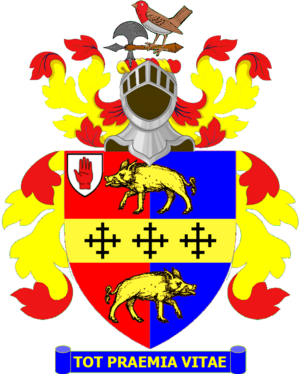Sir Edward Sullivan, 1st Baronet facts for kids
Sir Edward Sullivan, 1st Baronet (born 10 July 1822 – died 13 April 1885) was an important Irish lawyer and politician. He was a member of the Liberal Party and served as a Member of Parliament (MP) for Mallow in the House of Commons from 1865 to 1870.
During his career, he held several key legal positions in Ireland. He was the Solicitor General for Ireland from 1865 to 1866, and later the Attorney General for Ireland in 1868. He then became the Master of the Rolls in Ireland in 1870, a judge who oversees court records. In 1881, he was given the special title of baronet. From 1883 until his death in 1885, he held the very important role of Lord Chancellor of Ireland, the highest judge in the country.
Contents
Edward Sullivan's Early Life and Schooling
Edward Sullivan was born in Mallow, County Cork, Ireland, on 10 July 1822. He was the oldest son of Edward Sullivan, who was a successful local wine merchant. His mother was Anne Surflen.
Edward went to school at Midleton and Portora Royal School. In 1841, he started studying at Trinity College Dublin, a famous university. He was a very bright student, becoming a "Scholar" in 1843. He earned his Bachelor of Arts degree in 1845. While at college, he was also chosen to lead the College Historical Society, a debating club, and won a gold medal for his public speaking skills.
His Career in Law and Politics
Edward Sullivan became a lawyer in 1848. He quickly became very good at his job. Within ten years, in 1858, he was made a Queen's Counsel, which is a special title for experienced lawyers. Two years later, he became a "Serjeant-at-law," another important legal role. Because he was not very tall, people sometimes called him "the Little Serjeant."
In 1861, he started advising the main government official in Ireland, the Lord Lieutenant. Then, in 1865, he became the Solicitor-General for Ireland. This role involves advising the government on legal matters.
Serving as a Member of Parliament
In 1865, Edward Sullivan was elected as a Member of Parliament (MP) for Mallow, representing the Liberal Party. This meant he helped make laws in the British House of Commons.
From 1866 to 1868, when his party was not in power, he focused on his legal work. He was involved in a very famous court case called the "Yelverton case." His questioning of a key person in that case was considered one of the best examples of legal skill in Irish history.
In December 1868, when the Liberal Party returned to power, Sullivan was promoted to Attorney General for Ireland. This is the chief legal advisor to the government.
Becoming a High-Ranking Judge
Edward Sullivan left parliament in 1870 to become the Master of the Rolls in Ireland. This was a very senior judicial position. In December 1881, he was given the title of baronet, becoming Sir Edward Sullivan of Garryduff, Cork.
In 1883, he reached the highest legal position in Ireland, becoming the Lord Chancellor of Ireland. Sir Edward Sullivan passed away suddenly in Dublin on 13 April 1885.
Sir Edward Sullivan's Family Life
On 24 September 1850, Edward Sullivan married Elizabeth Josephine Bailey, who was known as Bessie. Her father, Robert Bailey, was a wealthy landowner. Edward was a Protestant, and Bessie was a Roman Catholic, which was known as a "mixed marriage" at the time.
They had four sons and one daughter. Their children included:
- Sir Edward Sullivan, 2nd Baronet (1852–1928), who later helped publish a famous book called the Book of Kells.
- Sir William Sullivan, 3rd Baronet (1860-1937).
- Blessed Fr John Sullivan SJ (1861–1933), who became a Catholic priest and is now considered a "Blessed" person in the Catholic Church.
- Anne (died 1918).
The family lived at 41 Eccles Street, Dublin. It is believed that the sons were raised in their father's Protestant faith, and their daughter Anne was raised in her mother's Catholic faith.
Edward Sullivan loved books and was a collector. He also enjoyed studying ancient languages and was good at many different languages.
His Influence and Legacy
People who knew Edward Sullivan said he was a very important person in Irish politics and a leading figure among judges. His title of baronet was seen as a well-deserved reward for the great help he gave the British Government during a difficult time in Ireland. When he was Lord Chancellor, he had a lot of influence over who was chosen for judge positions.
Arms
 | Victor J. Glover |
 | Yvonne Cagle |
 | Jeanette Epps |
 | Bernard A. Harris Jr. |


